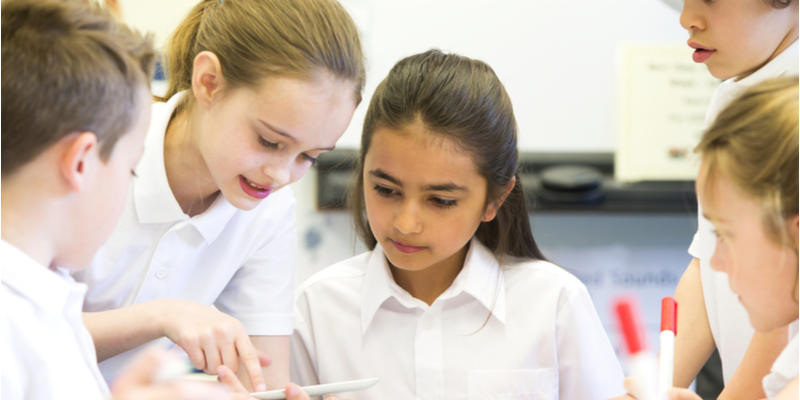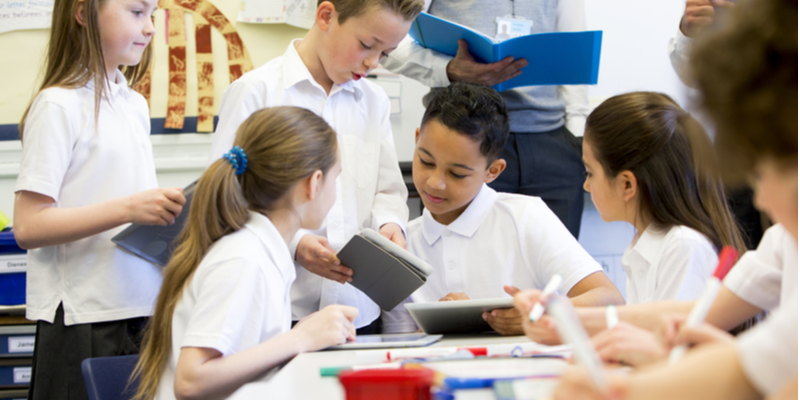Developing Oracy Skills at Key Stage 2 with Speech Therapy Strategies

Contents
The foundations of speaking accurately and fluently
A recent outstanding Ofsted report said the following about Oracy:
“ A strong focus on oracy, the ability to talk fluently and accurately and express ideas develops a pupils confidence, self-esteem and communication skills”.
When we think of the word “fluently” in regards to speech, the first thing that springs to many minds is fluid, well-paced uninterrupted speech As well as fluency there are other aspects of expressive language that can affect oracy skills and strategies we can use to support pupils struggling in these areas.
Grammar
By the time pupils reach Key Stage 2, their spoken grammar should be similar to that of an adult. There are likely to be some minor errors in written language, but the spoken language should be better. However, there are pupils that struggle with spoken grammar too. These difficulties often occur alongside “word-finding difficulties” or problems with syntax.

The grammatical delay is the most common presentation which affects fluent oracy. In Reception and early KS1, it is typical for children to struggle with irregular past tense morphemes, e.g. I fell over, and irregular plurals, e.g. the cat chases the mouses. By KS2, this should be resolved.
Children with grammatical difficulties may use very simple sentence types when they speak avoiding subordinate clauses and adverbial phrases. They may also show omissions of function words such as auxiliary verb, and determiners. Sometimes they have deficits in morphological awareness too, e.g. derivational morphemes, such as prefixes and suffixes.
What can we do to support oracy?
- Indirectly correct their speech by repeating their sentence and modelling the correct terms.
It may be worthwhile assessing their understanding of tense and plurals as if they have limited receptive grammar; this will impact their expressive use. - Refer to a Speech and Language Therapist. Like difficulties with syntax, problems with expressive grammar can be indicative of an underlying disorder that will require specialist assessment and treatment.
Prosody
Prosody is an umbrella term that covers many aspects of expressive speech. When a Speech and Language Therapist talks about prosody they are referring to:
- Voice pitch – is the pupil’s voice too high or too low?
- Speech pace – We all know that one pupil who speaks faster than Usain Bolt runs!
- Speech volume – or that child who speaks quieter than a mouse or crazy loud!
- Intonation and stress – those pupils who seem to have an American twang?
Yes, here we are talking about difficulties with prosody. Children can often struggle with one or more aspects of prosody. This can make oracy tasks difficult. And they can be tricky to understand.

What can we do to support oracy?
- Sounds simple, but monitor your own rate of speech and model an appropriate one.
- Record the pupils speaking and play it back to them. The pupil needs to eventually independently recognise their errors and so letting them hear retrospectively what they are doing may help.
- Discuss fast vs slow, loud vs quiet speech. Use animals/objects or discuss the social situations in which different types of prosody are important.
- If the child very loud finds out if speech volume could be due to hearing loss
- If the pupil is very quiet consider their anxiety levels in different situations – are there ways to support this pupil to feel calmer?
Syntax
Syntax is the posh term for word order in a sentence. Often children, especially those with speech, language and communication difficulties such as DLD (Developmental Language Disorder) may mix up the order of words, or omit keywords altogether. This can make sentences sound jumbled and difficult for others to figure out what they are trying to say.
What can we do to support oracy?
- When a pupil mixes up words in a sentence, repeat back what they have said but place the words into the correct order, thus providing a good model of language. This way of indirectly correcting the pupil is a good way of keeping their confidence in communicating.
- Sentence completion – start a sentence and then leave a gap for the pupil to complete e.g “Over the summer holidays I went to…..”
- Refer to a speech and language therapist. Often pupils with syntax difficulties will require specialist intervention
Vocabulary
We all get the “tip of the tongue” sensation when we know exactly what we want to say but just can’t find the word. However, for many children “word-finding difficulties” is a part of everyday life and can lead to frustration and increased anxiety around communicating. Word finding difficulties are different to a child simply having an impoverished vocabulary. Children with word-finding difficulties have a good understanding of words but have difficulty retrieving them to use in context.

Some pupils may construct sentences full of “fillers” – empty words and phrases – which give the impression of a long sentence e.g “So we went to that thing on errrm, the other day…..and it was, you know….okay”.
What can we do to support oracy?
- Encourage the pupil to talk around the word they cannot recall by describing its function, size, colour, location etc…. Games such as “Guess Who” and “Headbandz” are great to build up descriptive vocabulary.
- Word maps and word webs are great tools to develop topic vocabulary.
- Offer the child a phonemic cue (give the first sound in the word) if you know what they are trying to say.
Time connectives
When describing events, pupils can often become muddled with the order in which the events occurred and overuse the connective “and”. This lack of structure often leads to one long list which can, therefore, make it difficult to follow exactly what they are saying.
.png?width=800&name=A%20group%20of%20school%20children%20can%20be%20seen%20working%20on%20digital%20tablets%20and%20whiteboards%2c%20they%20are%20all%20working%20happily%20(1).png)
What can we do to support oracy?
- Carry out activities that practise the use of time connectives such as “first, next, then, last etc”. For example, cooking, building a Lego figure, setting up for PE.
- Sequencing cards or photos of activities can also be used.
- And remember…….model these terms in your own speech!
Pronunciation
Lots of pupils struggle with their speech sound production. This is easily recognisable and is one of the first things we perceive about other people’s speech. Things like a “lisp” are straightforward to identify. Other more complex speech sound disorders can be trickier to figure out what is going on. It may sound like a pupil has a favourite sound usually /d/ or /g/. It may seem as if they are bunged-up and have a bit of a cold or they may have a totally idiosyncratic way of talking.
What can we do to support oracy?
- Think about the child’s awareness of their difficulty. Try not to draw attention to it in front of the rest of the class and reduce anxiety where possible.
- Don’t correct their production or ask them t copy you. It is likely the reason they are not using sound accurately is that they can’t! Not because they don’t want to
- Note whether their speech difficulty is affecting other aspects of their life. Relationships with peers, attainment in English and Maths
- Speak to the child and their parents about a referral to a Speech and Language therapist.
If a child is struggling with any of these aspects of language and especially If they continue to struggle with literacy difficulties into KS2, it is highly likely they have an underlying speech and language need. There are too many children starting Y7 with poor literacy difficulties and that is because phonics is not the only step to becoming an accomplished reader.
For an assessment of language skills contact one of our speech and language therapist here. We have no waiting list, over 30 specialist therapists and reports returned within 7 days.